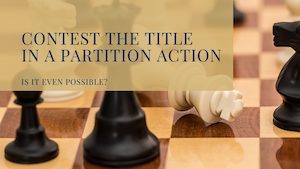
In many ways, partition actions are relatively straightforward. Generally, in a partition action, the two property owners cannot agree on its use, and one of the owners asks the court to sell the property so each can go their separate ways.
The question arises of whether one of the two persons actually owns the property in the first instance. When there is a question of whether one of the parties is an owner, can you contest the title in a partition action? The answer is “yes,” as one of the primary purposes of a partition action is a determination of title.
Generally, at trial, the court must determine whether the plaintiff has the right to partition. (CCP § 872.210(a).) A question of ownership of property, as presented in a partition action, may be one of fact or law, depending on whether the determination of the issue involves a decision on conflicting facts or the application of the law to a stated set of facts. (Lieb v. Superior Court (1962) 199 Cal.App.2d 364.)
Who Decides the Validity of the Title at Issue?
When the title of one of the parties is in question in a partition action, then a court may or may not submit such issues to a jury. (Lorenz v. Jacobs (1881) 59 Cal. 262.)
Alternatively, the court may appoint a referee to ascertain the facts necessary to determine whether a sale of the property and division of the proceeds would be more equitable than the division of the property and to perform the actual partitioning of the property whether by division, by sale, or by appraisal. (CCP § 873.510.)
Why would a court submit the matter to a jury rather than a referee?
While a partition action generally involves just a determination of title and the distribution of proceeds from the sale, it may involve more than just those things. For example, a partition action may be joined with a claim for breach of contract.
In those instances, “[i]t is well settled that litigation is not to be tried piecemeal and that the general rule is that there can be only one final judgment in an action.” (Bank of America Nat’l Trust & Sav. Asso. v. Lamb Finance Co. (1956) 145 Cal.App.2d 702, 715.)
Nevertheless, even where a case presents only a partition claim, and it presents some equitable issues and some legal issues, then the parties are entitled to a jury trial on the legal issues. (Orange County Water Dist. v. Alcoa Global Fasteners, Inc. (2017) 12 Cal.App.5th 252, 254; Raedeke v. Gibraltar Sav. & Loan Ass’n (1974) 10 Cal.3d 665, 671.)
Moreover, wrongful denial of the jury trial right is a reversible error per se. (People v. One 1941 Chevrolet Coupe (1951) 37 Cal.2d 283, 299; Collins Development Co. v. D.J. Plastering Co. (2000) 81 Cal.App.4th 771, 778.) The wrongful denial of a jury trial right subjects a judgment after trial to reversal. (Van de Kamp v. Bank of America (1988) 204 Cal.App.3d 819, 862-863.)
As such, a judge may submit a partition claim to a jury when there are mixed issues of fact and law and because the mistaken denial of a right to a jury could subject the judgment to reversal after trial.
What should I do if I have a trial in a partition case?
If you are faced with a trial in a partition action and need advice about how to proceed, then you may benefit from good legal advice on the topic. If you find yourself contemplating a partition action, or faced with defending one, then please get in touch with Underwood Law Firm, P.C. for an initial consultation.
Go here to get more details.
 California Partition Law Blog
California Partition Law Blog

